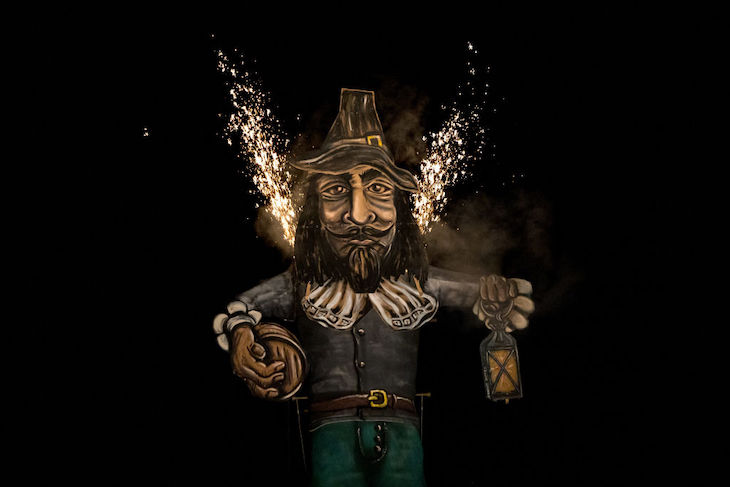My reaction to fireworks is a bit eccentric. Lovely, I think, but can’t they be more meaningful? To be more precise, this is my view of Bonfire Night, formerly known as Guy Fawkes night. It would be nice, I think, if we could revive the annual event as a celebration of our shared values. To be fair, it retains a faint gunpowdery whiff of this. Most Britons are aware that we are celebrating a historic victory over terrorism. But the awareness is fading.
Ideally, Guy Fawkes would have belonged to some obscure sect that is now safely defunct
The main problem with trying to revive the meaningfulness of this festival is that it is linked to anti-Catholic bigotry. Ideally, Guy Fawkes would have belonged to some obscure sect that is now safely defunct. Then we could all innocently burn him in effigy, for he would be a mere symbol of terrorism.
Another problem with trying to re-inject meaning into Guy Fawkes is that 1605 is pretty far in the past. Yes, parliament was already important, and there was already a noble tradition of the rule of law and so on. But these stirrings of liberty could still be muffled by a monarch in a mean mood. It was only at the end of that century that England became recognisably modern, when it created a constitution that cancelled the possibility of tyranny, in the Glorious Revolution of 1688.
If only there were some way of widening the meaning of Bonfire Night – so that it also referred to this later event, and helped Britons to know their history. For, let’s be honest, almost no one without a history degree has heard of this revolution.
Well, there is. For it happens that the routing of the tyrannically inclined James II, and the arrival of William of Orange, also occurred on 5 November. Whether this was a coincidence or a cunning bit of Protestant PR, I do not know.
What I propose is this: we should bother educating our teenagers (and their parents) in the history of this country. Every 5 November, there should be educational events telling the story of the seventeenth century in England. There should be drama workshops, lighthearted lectures, people dressed as Oliver Cromwell, a festive bustle in Parliament Square.
The weird thing is that history syllabuses seem to avoid this period. The average history student jumps from the Tudors and the Cold War at GCSE to the late Georgian era at A-level, plus more Cold War, plus the Russian Revolution. The really decisive bit of our history is passed over as if it’s an irrelevance or embarrassment. Let the authors of history syllabuses please explain themselves. Maybe they are scared of looking ‘Whiggish’ if they ask students to focus on this period. But the result is that no one under 50 knows what ‘Whiggish’ even means. I don’t get it. It’s bizarre. This ideology basically gave rise to political liberalism, which remains our political reality – just about, thank God – but we fail to be proud of it. Unlike the Americans, who nicked the whole ideology a century later.
Incidentally, this day is also when America votes, every four years. Some years it will add to the festivity of Freedom Day – that we can smile or frown at what our noisy cousins have done with their English inheritance.








Comments